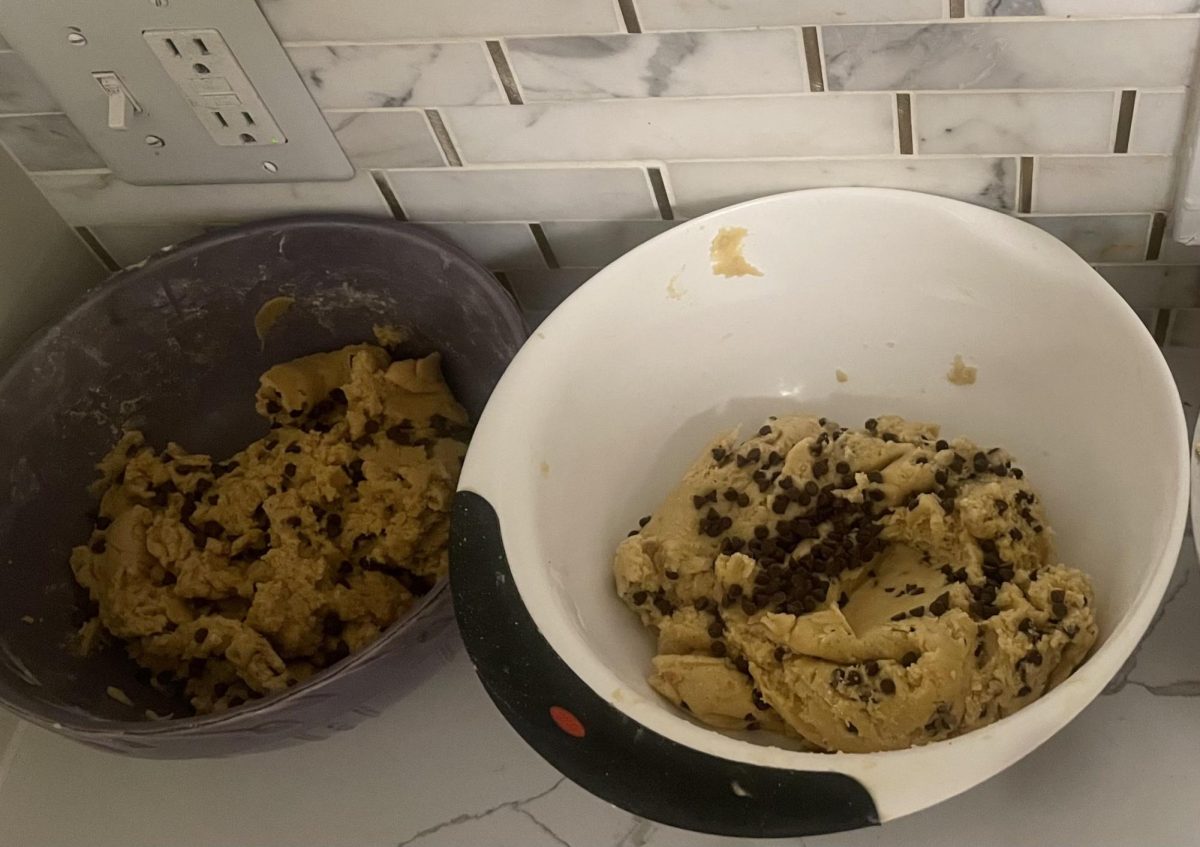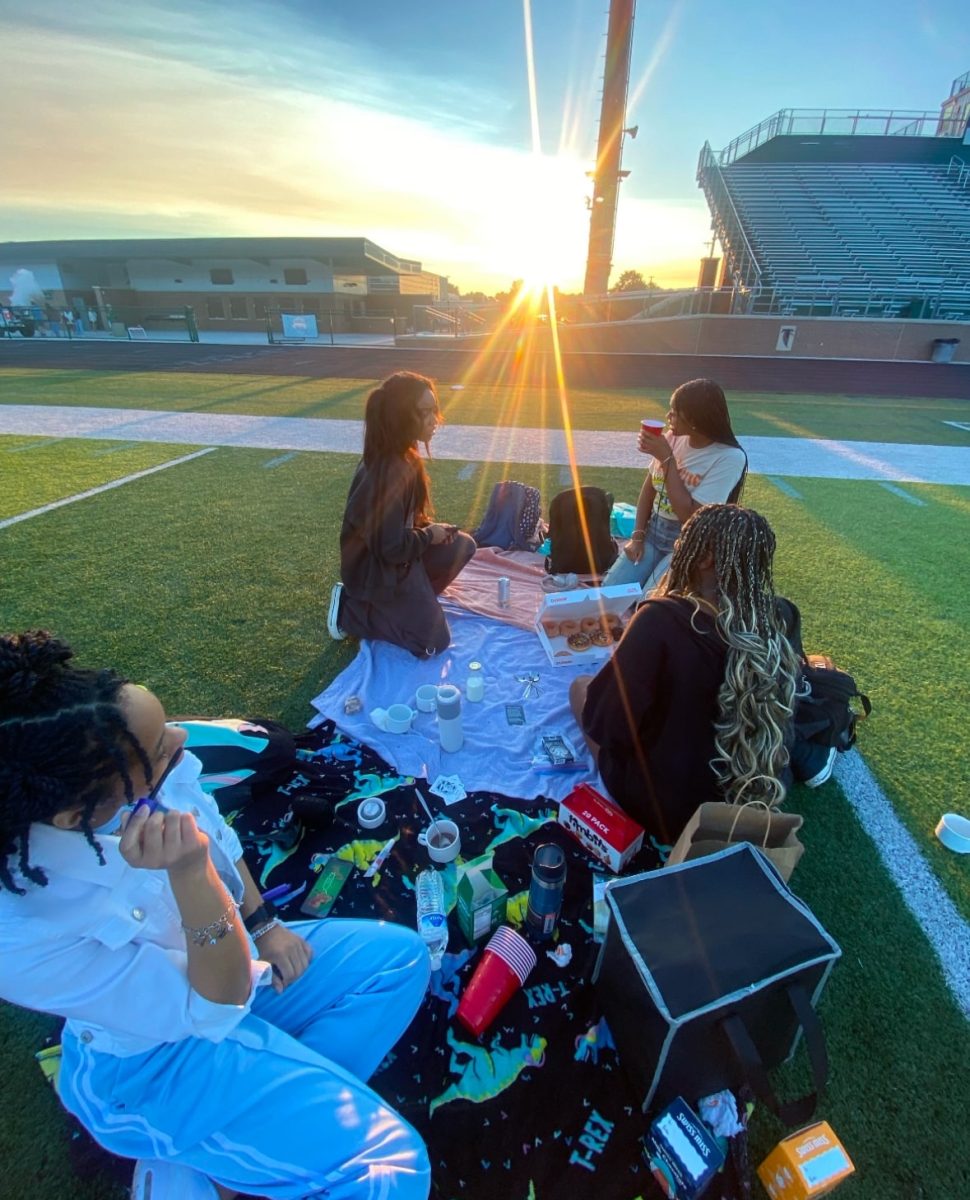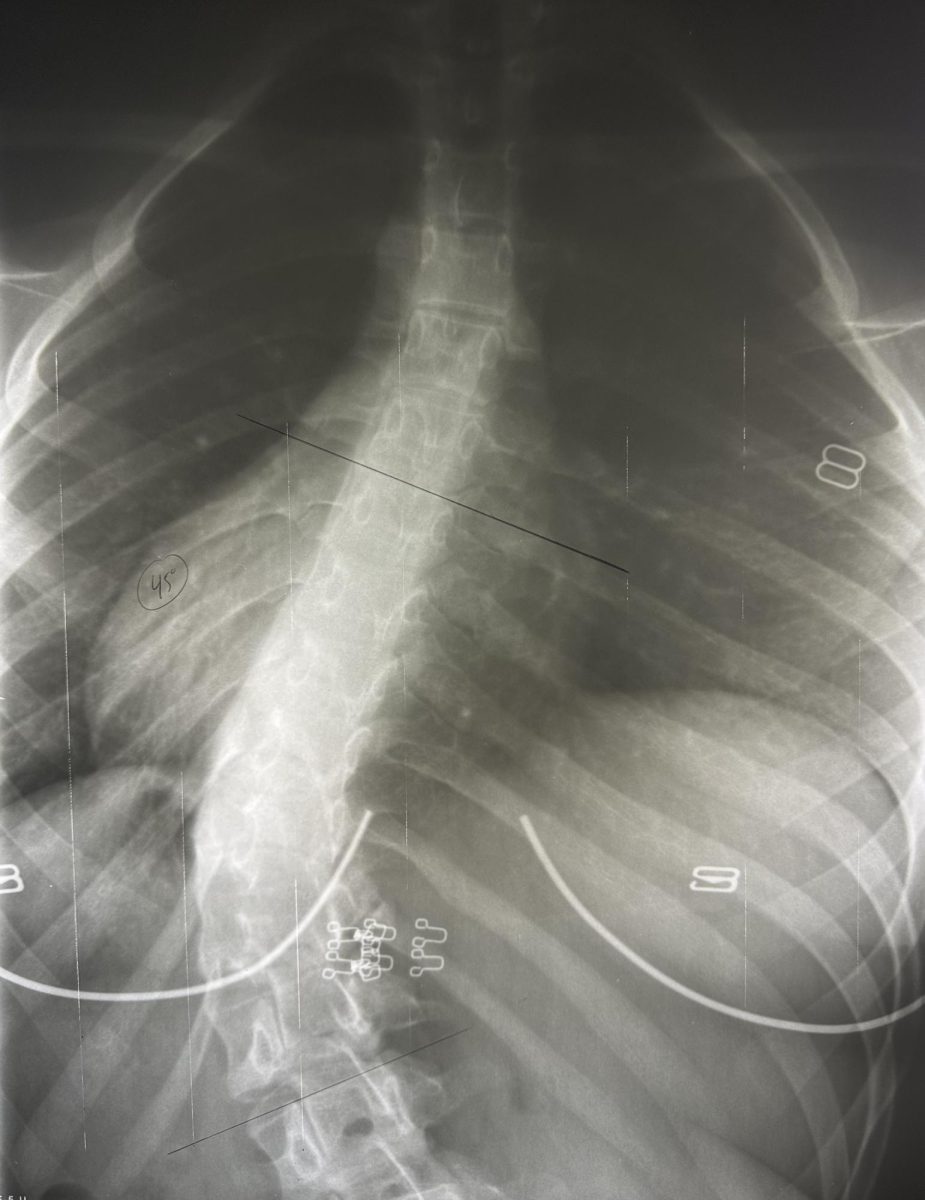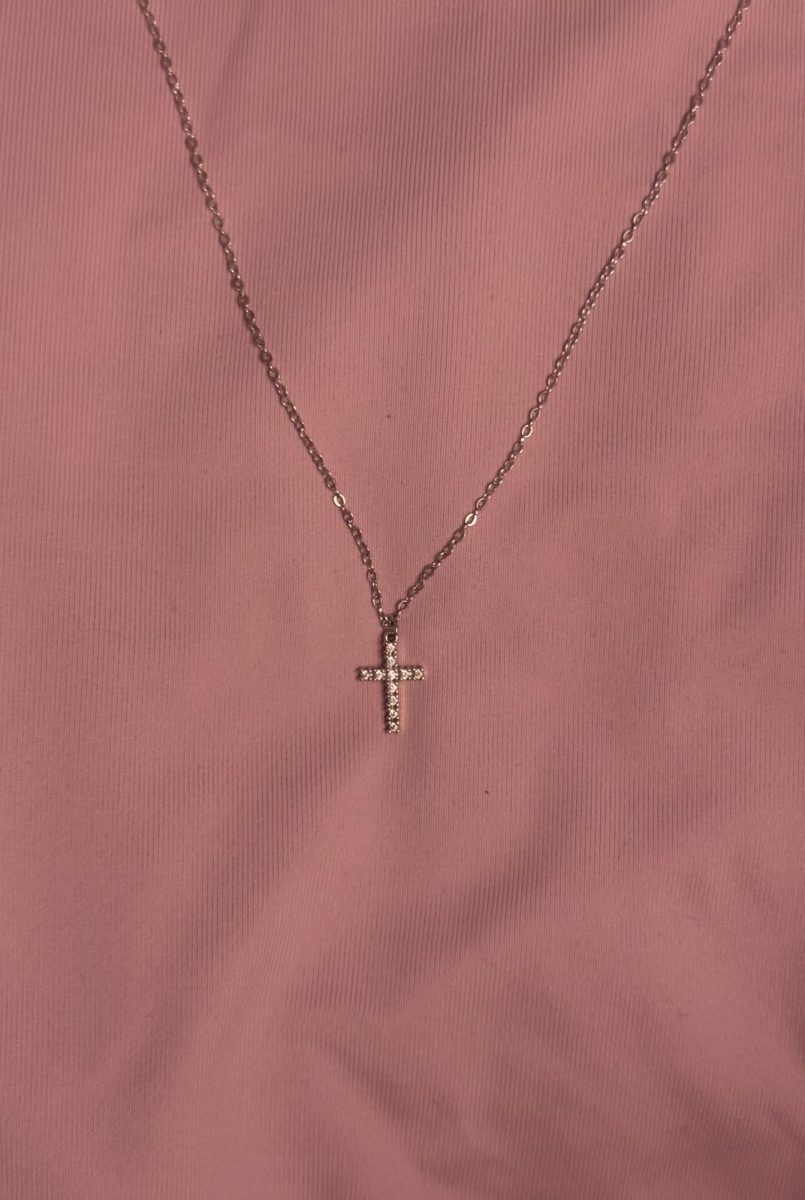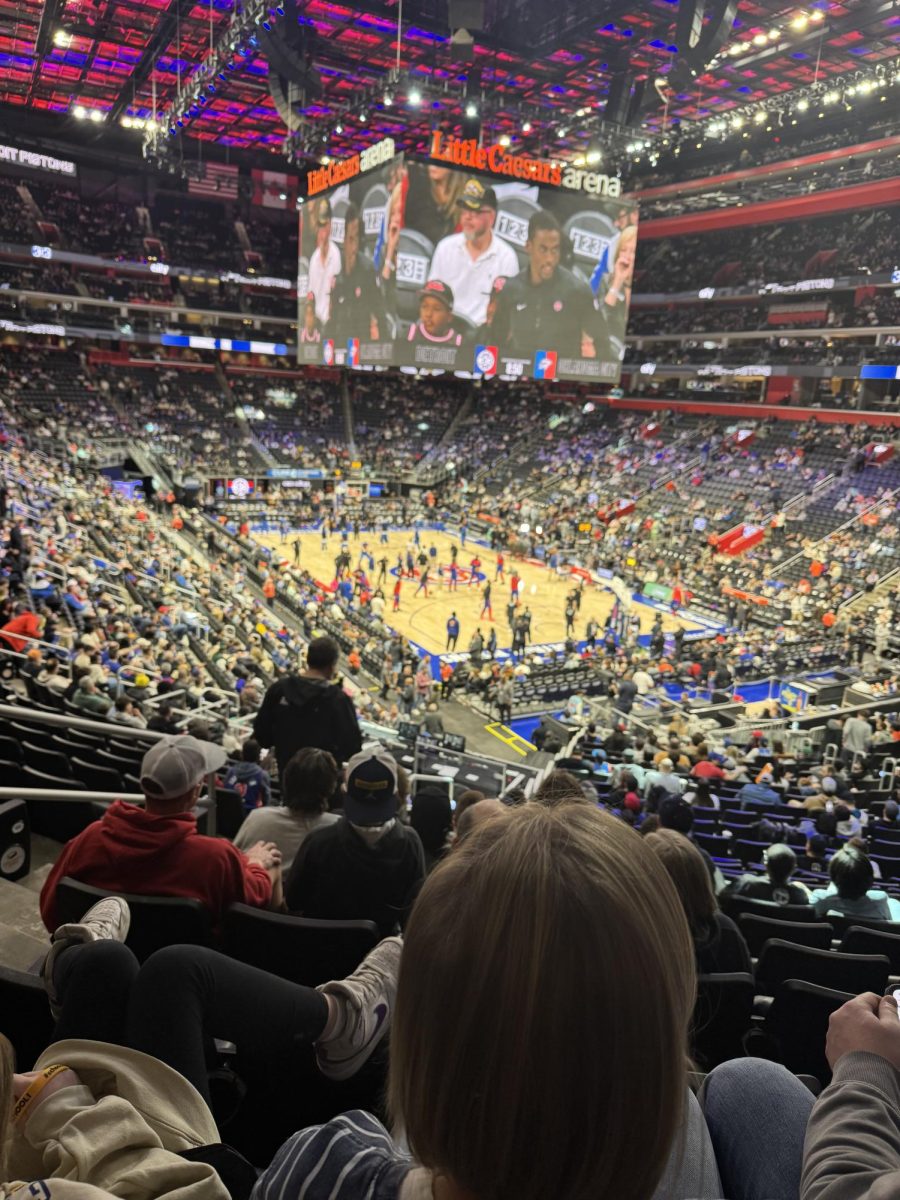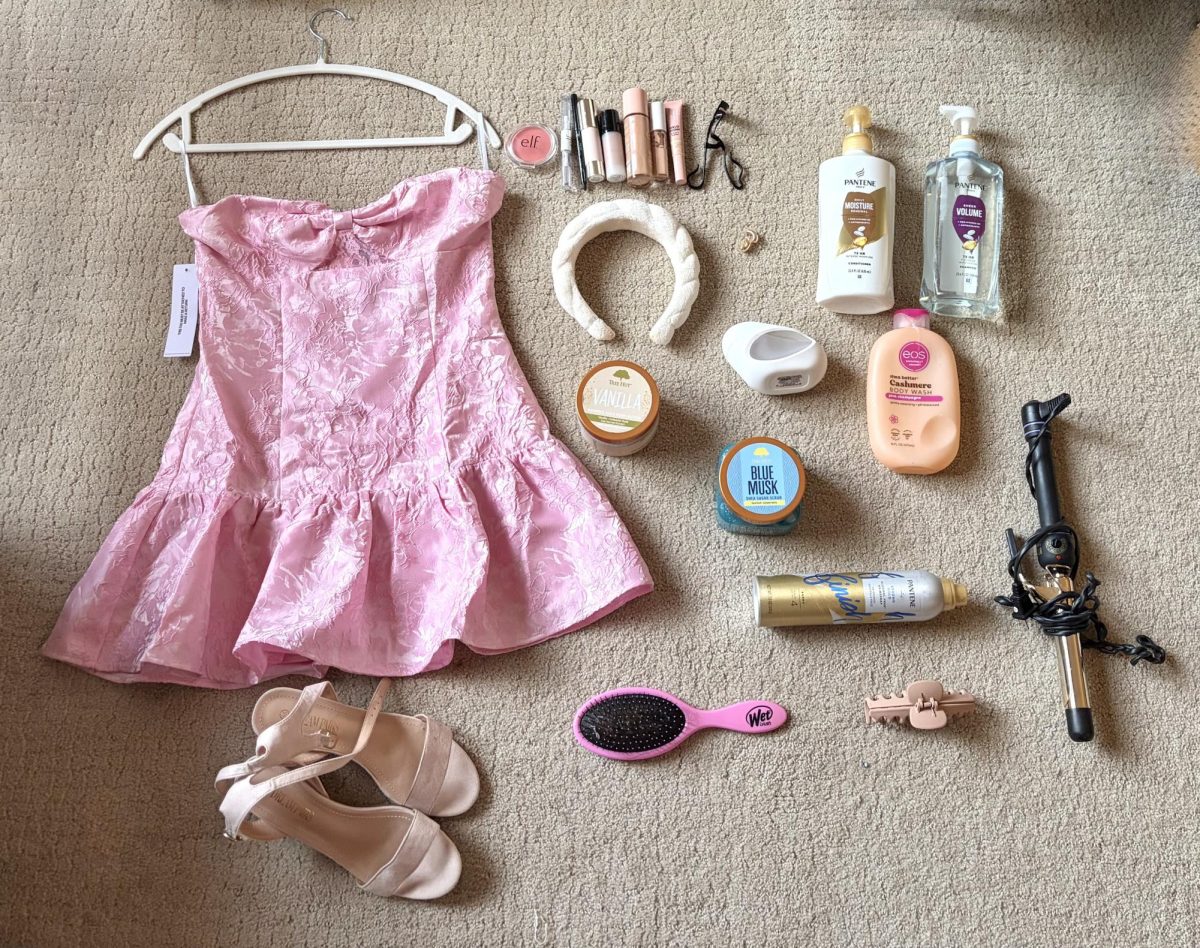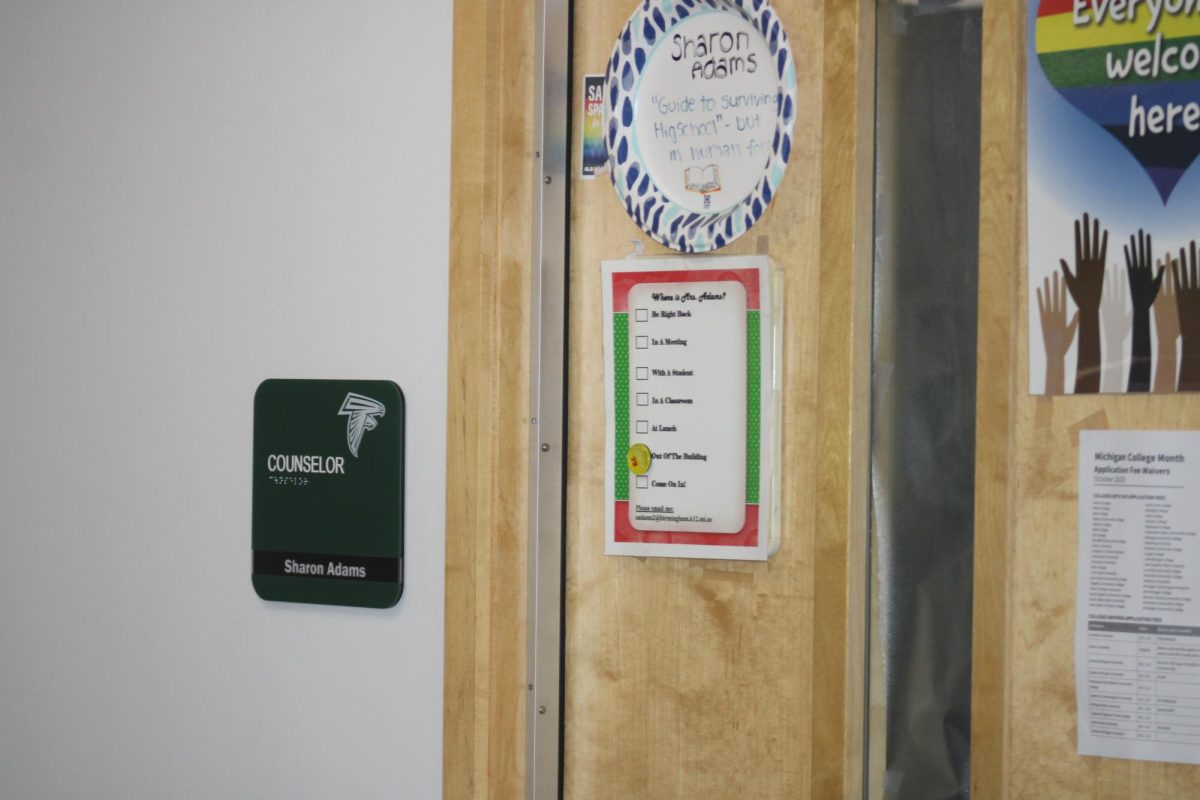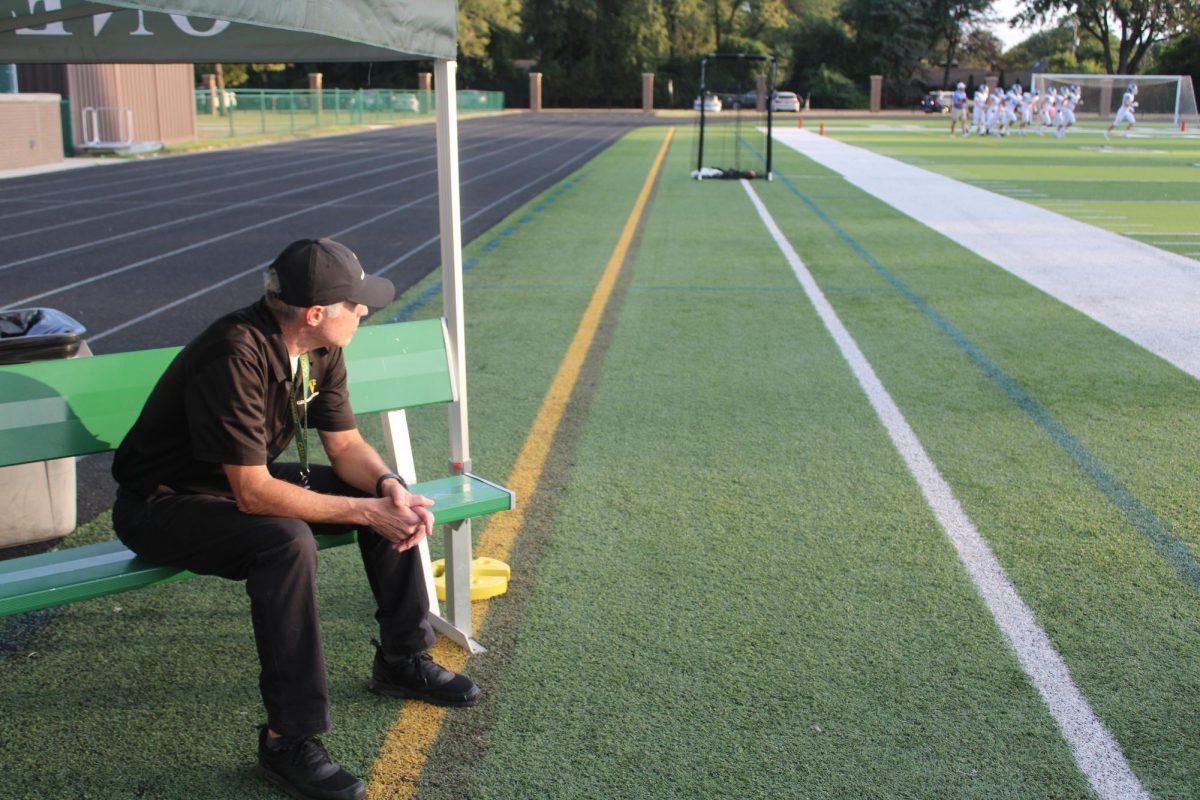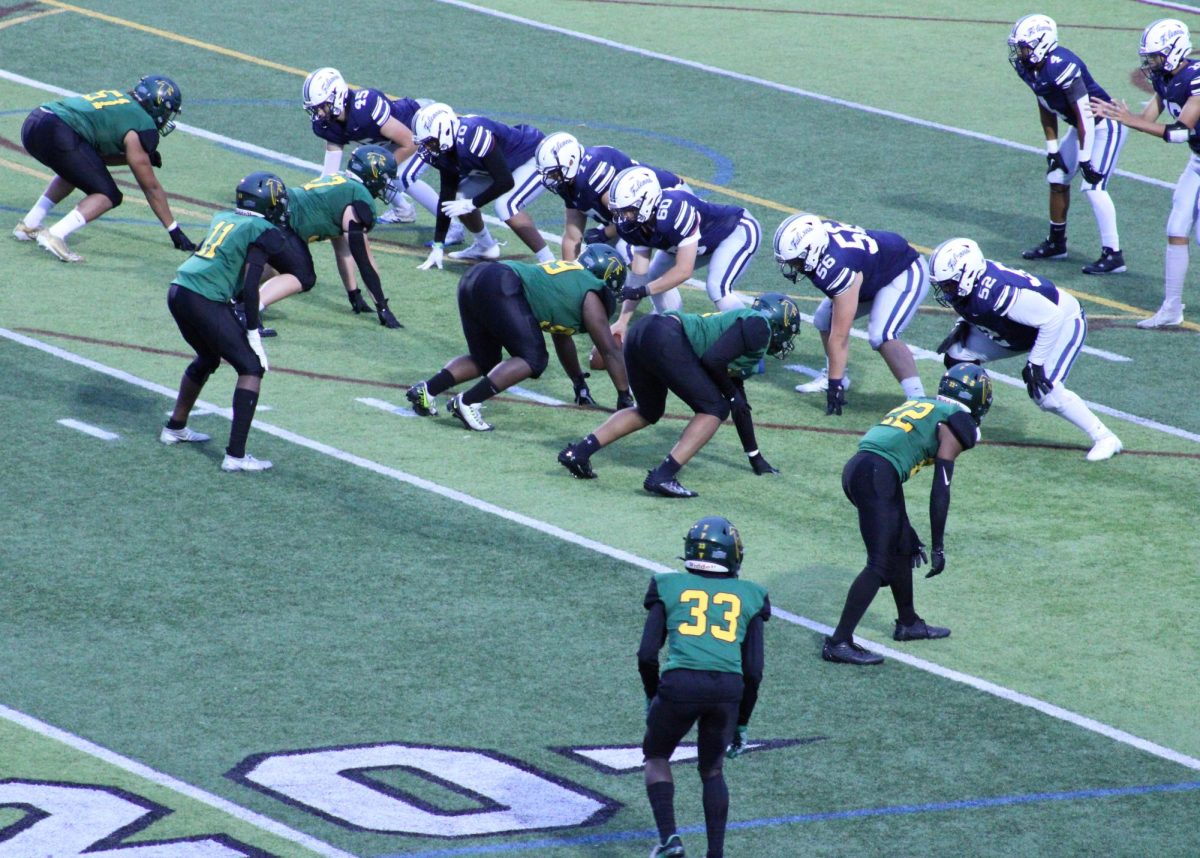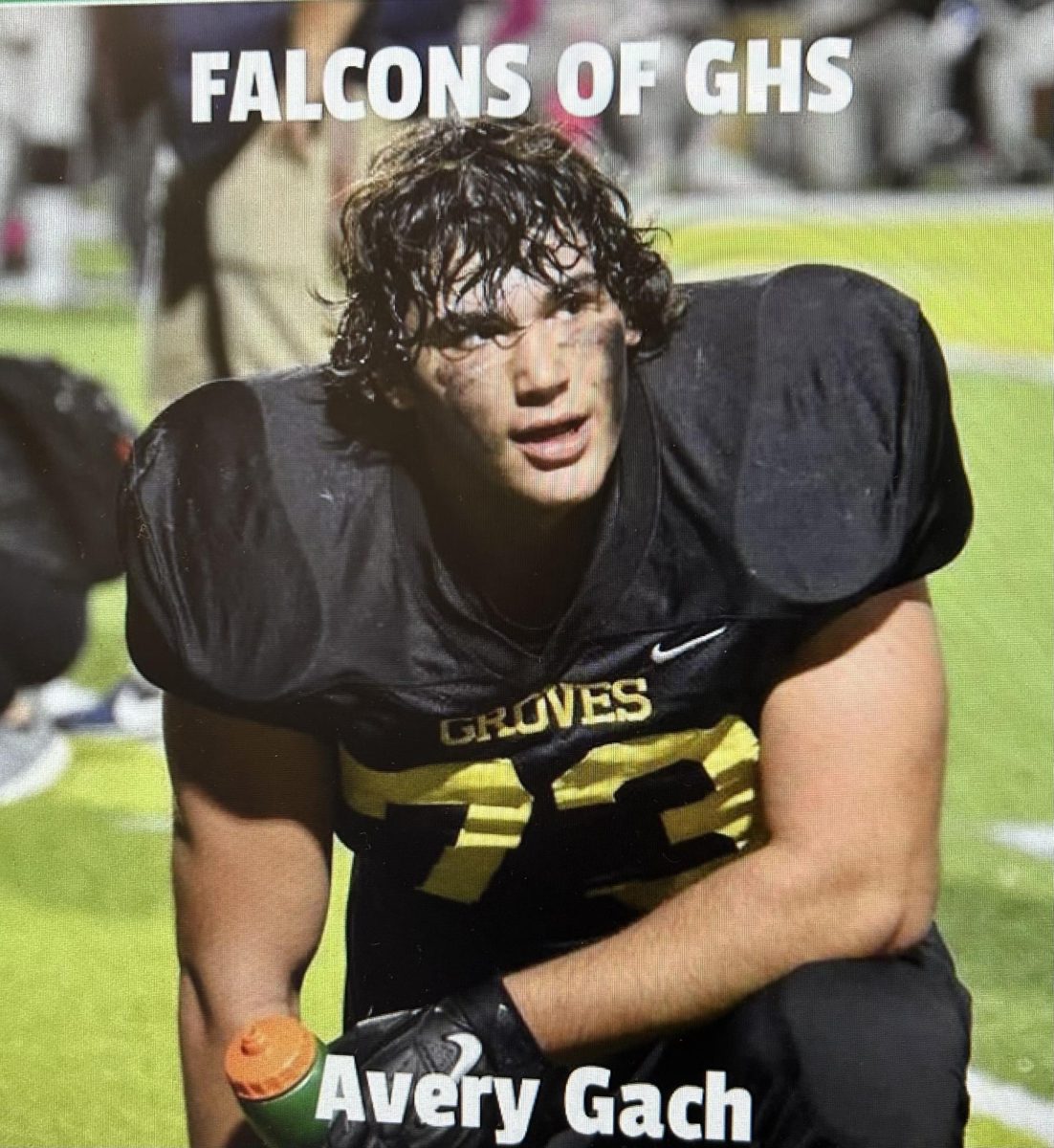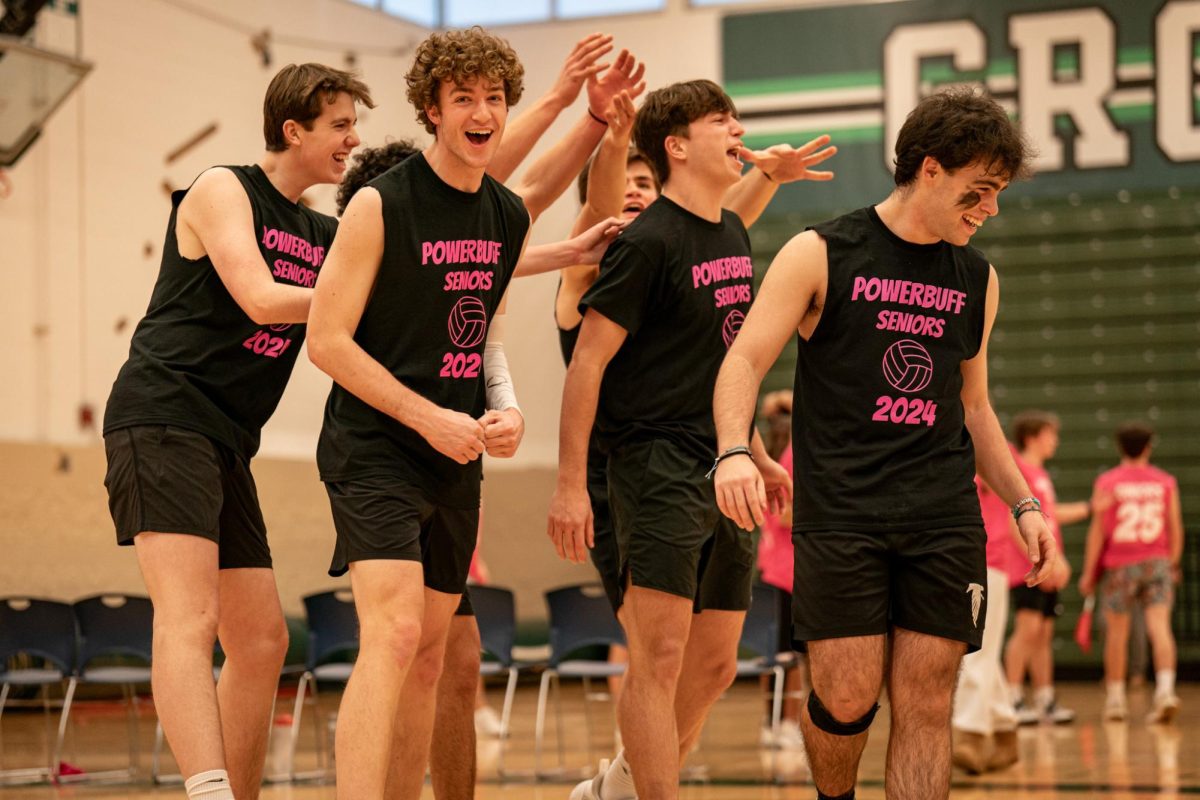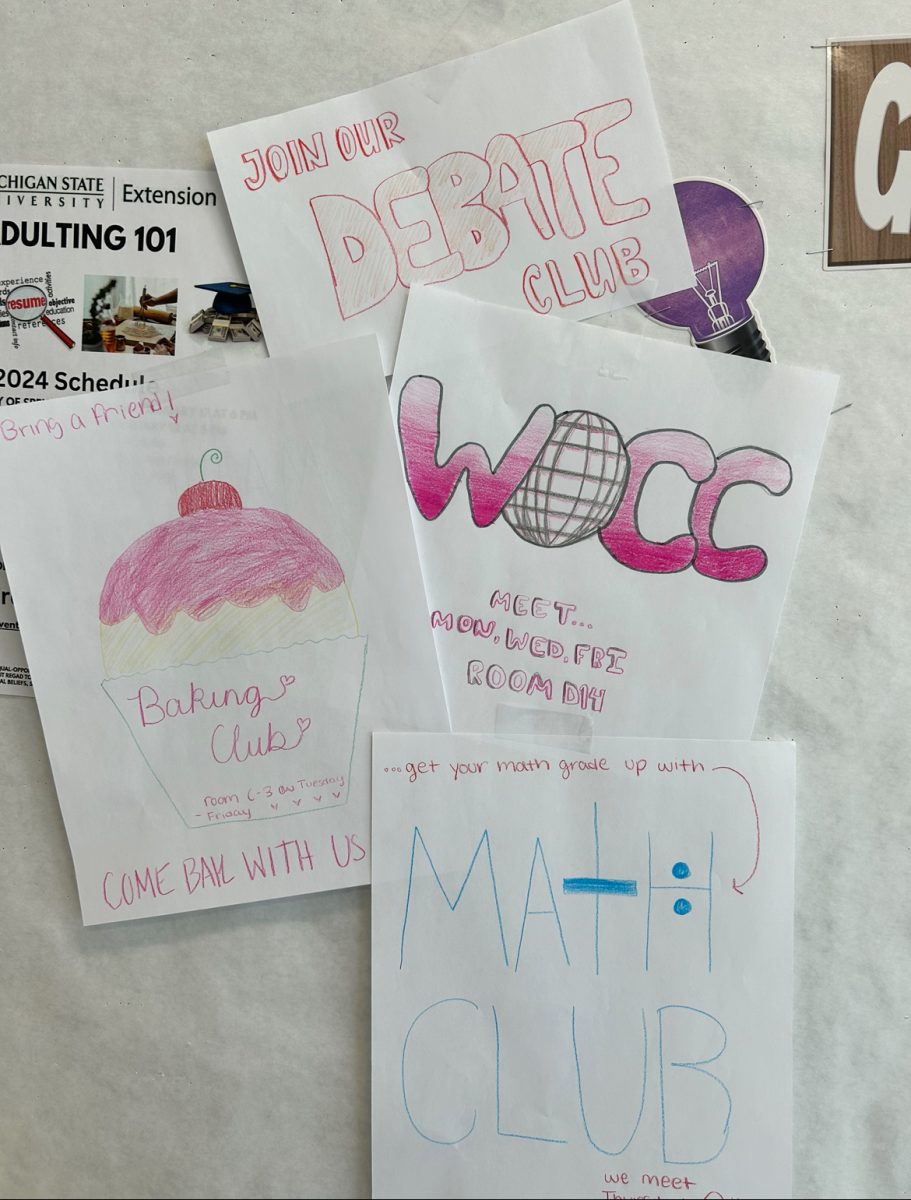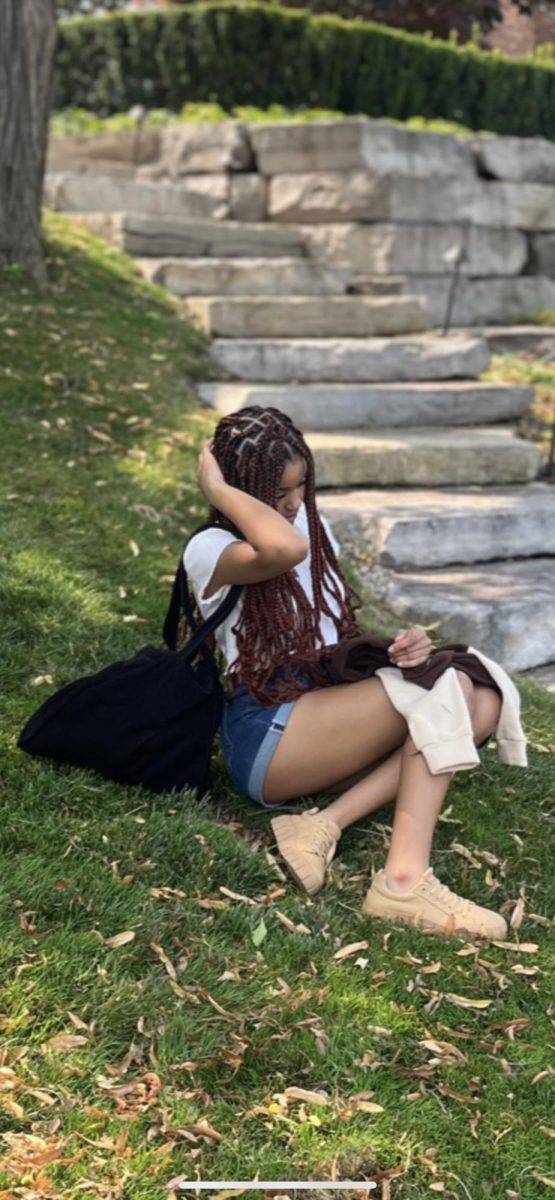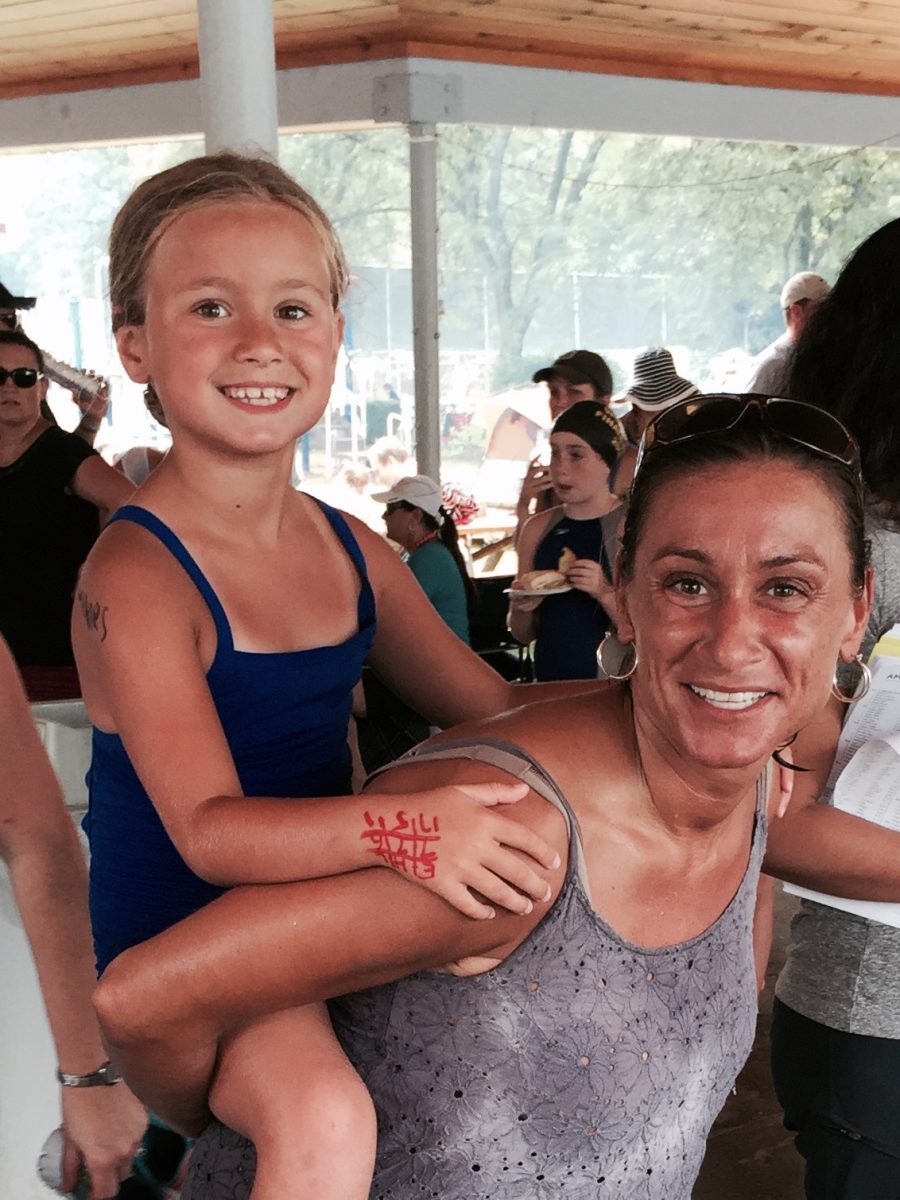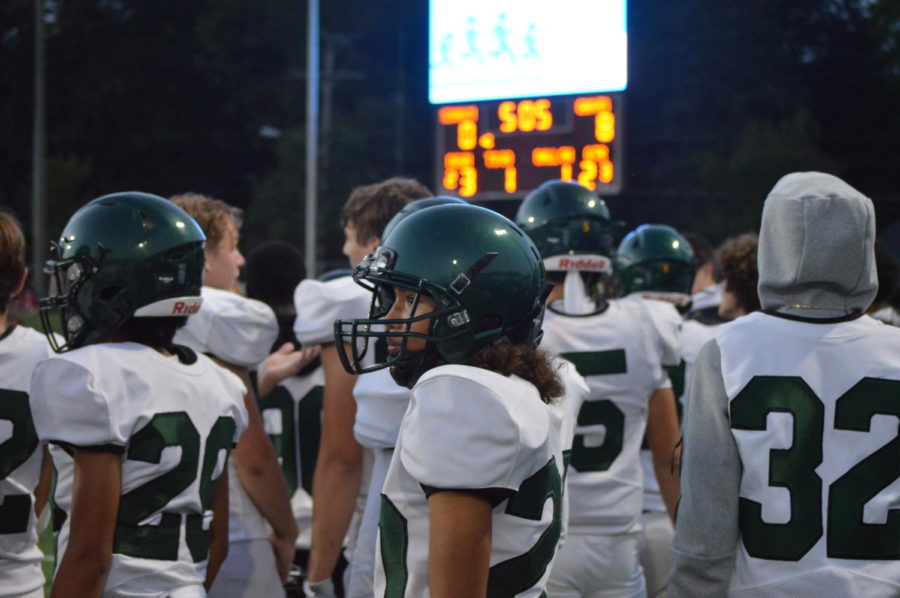Team embraces junior Alesha Wiles-Austin as she overcomes gender bias in football
Junior kicker Alesha Wiles-Austin watches varsity players line up against Seaholm on September 17. Groves beat Seaholm 21-14 in a game that highlighted the season for many athletes. As the only girl on the team, Wiles-Austin was left out of the celebration that took place in the locker room. “That’s the one part of football that I don’t like. I can’t celebrate with the boys. After her game, they go into the locker room and I can’t go in. After Seaholm, they were taking pictures with the box with maple cookies. They were taking photos and stuff and I couldn’t do it. But I was on the field when we won,” Wiles-Austin said.
Her heart slammed against her chest, falling in rhythm with the pounding on the lockers. A thunderous chorus of shouts rumbled into the hall, drowning out her uncertainty. Cheering roared from the school, amplifying as the crowd joined in.
Junior varsity kicker Alesha Wiles-Austin listened from the hallway as her teammates prepared for their game against Seaholm. As the only girl on the football team, she was used to feeling left out of locker room camaraderie. After games and practices, she went back to an empty locker room that contrasts the lively energy on the field.
“Every game day, the boys will meet up and they stay in the locker room until we go to the team meeting. I wait in the hallway because I can’t go into their locker room. The other locker room is usually locked, and I don’t ask the coach to open it. I don’t need to sit on my own when I can just stay in the hallway. After home games, when we win, I can’t go in there, but the guys are just cheering the whole time. They’re so hyped up, and I can’t be a part of it. I feel left out. That’s the one part of football that I don’t like. I can’t celebrate with the boys,” Wiles-Austin said.
Despite being alone in the locker rooms, Wiles-Austin has been welcomed onto the team in every other aspect. Having moved to Michigan from Tennessee, Wiles-Austin found an instant feeling of camaraderie with her teammates.
“I’ve never felt excluded from the boys. They make me feel really included. We make jokes the entire practice. If we’re sitting on the side, someone will say something and we’ll all laugh. I feel like people show more love here. People want you to succeed. They want you to do better. I feel supported,” Wiles-Austin said.
The inclusive atmosphere was a pleasant surprise to Wiles-Austin. After witnessing biases against a girl on her high school team in Tennessee, she was prepared to overcome discrimination.
“At my old school, there was a girl on the football team. She didn’t get played that much because the coaches didn’t really want a girl on their team, so I never thought that I would play football. But, I came here, and you guys didn’t have a girl, so I was like ‘why not?’. People don’t do something until someone starts it,” Wiles-Austin said.
Despite the lacking experience, Wiles-Austin saw no reason why she could not play for Groves. She purchased a football and practiced at a nearby park to ensure that she could kick well enough to be on the team. Wiles-Austin approached head coach Brendan Flaherty, prepared to prove herself. She was pleasantly surprised when she was only given a short interview before joining the team.
“I went to Coach Flaherty’s office, and he gave me a thirty-second interview. He asked why I wanted to be on the team and I told him that I wanted to show other girls that I could do it. After our talk, I started going to the summer practices. We got up really early, and I would always show out. I’d always do really good. I’m not going to say it was easy, but It’s not as hard as it’s made out to be,” Wiles-Austin said.

Wiles-Austin continues her optimistic attitude both as a member of the football team and in other extracurricular activities. She maintains her job, school work, and practices all while maintaining a social life. By balancing so many responsibilities, Wiles-Austin hopes to set an example for others.
“I’m an honor roll student. I haven’t gotten a B since I’ve been in high school. I’m doing a lot of stuff right now with football and preparing for soccer season, and I still want to do track. I’m also doing a Science Olympiad. I just have a lot on my plate, and I also have work. I just want to show that you can do it all. You can. It might be hard, but it’s possible,” Wiles-Austin said.
Her biggest motivation, however, is her mother. After years of battling colon cancer, Wiles-Austin’s mother passed away on October 20, 2020. Wiles-Austin draws inspiration from her mother daily and chose her jersey number to honor the date she died on.
“I think my biggest role model would be my mom. She was so strong. My mom was a single mom. I have three siblings down in Tennessee. It wasn’t a really small house, but our house wasn’t big either. We each had our own room, kind of. My brothers shared a room. I had my own room, and my mom had her room, but she would always take in kids. She would move her bed to the living room, so they could have her room. She would work twelve hours every other day just to support us. For the church, my mom was always the person who brought the snacks. People were just happy to be around her. She was lively, and she got accepted into Harvard. So did my dad. They just didn’t go. They wanted to go somewhere else, but both of my parents are really smart. So I want to be on their level,” Wiles-Austin said.
Wiles-Austin’s ability to play football also stands as a reminder of her mother’s failing health. She appreciates what her body is capable of, as she remembers seeing her mother struggle with seemingly simple tasks.
“My mom has been sick since I was little. It wasn’t as bad as it became, but she had cancer before. She had a pacemaker; it’s like a fake heart. She had to learn how to walk again. Because she had surgery and she was paralyzed. So, she had to have a walker. When we go up two steps, that’s easy for us. We can just run up those, but she had to take a break in between each case. It was bad. Then, when she got to the hospital I tried to keep my mind off of that. Me and my brother, we tried to clean the entire house. I tried to stay on my books and stuff just so that I wouldn’t be focused on that. I tried to alternate my focus, so I wasn’t really thinking about her illness because I thought she would get better, but she didn’t,” Wiles-Austin said.
Rather than allowing grief to overwhelm her, Wiles-Austin continued to distract herself. She worked towards accomplishments that would have made her mother proud, allowing her to stay connected to her mom more than anything else.
“How do I keep it all in check? I put things to the side. Some people don’t deal with grief and that’s better for them. That’s better for me. Time is valuable, so I don’t wanna sit here crying because my mom was taken away from me. I don’t wanna be mad about that. I use my time to do something more productive like football and being the first girl to play football and creating opportunities for other girls to do it. My mom would be proud that I’m doing all of this: keeping it balanced and still keeping my grades up. She would be proud, and she would tell me just to keep going. To keep pursuing my dreams,” Wiles-Austin said.
Keeping busy distracted Wiles-Austin from her mother’s illness. She worked on extracurriculars to avoid the possibility of losing her mom. In the process, she developed a mentality that allowed her to make the most of her time. Playing three sports, keeping good grades, and maintaining a job are all achievable to her. Wiles-Austin has yet to find a challenge she could not overcome.
“For football, I don’t go to every practice because I have work on weekends and Mondays. so my schedule is laid out and my bosses are good at helping me balance it out. For school, I just get my work done quickly. I’ll do it in other classes or I’ll do it after practice or before work. Just anytime I can get it done. And then for extracurriculars, I’m debating doing Science Olympiad. But I may do wrestling. I don’t know how I balance it, but it kind of just works. I just get things done whenever I can,” Wiles-Austin said.
Despite the activities that she juggles, Wiles-Austin still finds the time to help out her teammates with homework as well. She adopts her mother’s mindset of helping others by supporting her friends any way can.
“If people need anything, I help them out. I am editing my friend’s essay right now because he’s behind on classes. One of the football players, he’s behind. So he can’t play next week unless he gets all of his work turned in, so I’m helping him out. If people need money for food, I’ll go get them food. I just like to give back as much as I can,” Wiles-Austin said.

Kicking Coach David Hayes watched Wiles-Austin acclimate to the team first hand. During his ten years at Groves, he has watched the football team welcome exchange students and girls alike. To Hayes, Wiles-Austin’s gender made no difference in her acceptance to the program.
“Alesha has been accepted by the entire team collectively. She’s been brought in since day one. Her gender has no difference in her being accepted into the program. She has a fantastic work ethic. Alesha shows up to practice on time all the time. She’s ready to go. She’s very coachable. She knows that she wants to get better at it. I am there to help her get better. Whatever Alesha is doing, I’m there to help her. Help her in mentoring, and coaching her to get better. With players on the team, we’ve had example after example after example of kids coming in not as a freshman. We’ve had to exchange students that I know of. One, Ruben, who was here for one year as an exchange student. There was Peter, another exchange student that we brought in and embraced. Tyler came over from Windsor in the midst of COVID, and he was brought in. The guys on the team have always been willing to embrace those that have come from the outside to Groves to be a part of what this program and high school represents,” Hayes said.
This mentality can be traced back to the ‘one love’ motto that the football team enforces in their players. Wiles-Austin noticed the embodiment of this phrase from the beginning. Her teammates supported her beyond the field, extending their encouragement to the weight room and class room as well. For Wiles-Austin her position on the team has never been questioned. She has fit in from the beginning.
“When we’re in the weight room, we always have to have a partner because iron sharpens iron, that’s the whole mentality. So, when you’re lifting and someone else is with you, they can tell you to keep going. They can push you to be better. ‘one love’ basically means that we’re a family. If we aren’t doing good, we can help each other to get better. ‘one love’ is really our motto. We really go by it. If somebody does something, or if they’re late then we all have to get the punishment. Not just them. We run with them,” Wiles-Austin said.
As Hayes watched Wiles-Austin grow, he watched her redefine their motto of ‘one love’. The phrase is now more inclusive. The meaning has shifted from a focus on bonding between men to unity between everyone regardless of gender.
“Obviously, before Alesha came up, it was about brotherhood and friendship. But the keyword today is friendship. Even on your worst days, everyone has got your back. We’re all looking to achieve one particular goal. Some players may have individual goals that they’re looking to get to, but their individual goals feed up to that one, top goal. Which is to be our very, very best,” Hayes said.
Though Wiles-Austin is not the first female football player at Groves, she is the most recent. Her level of athleticism has pushed Groves football coaches to consider having more girls in the future. To Hayes, Wiles-Austin is a part of a growing legacy that female athletes have developed at Groves.
“Groves, overall, has had some fantastic female athletes. I’m sure everyone has heard about Annie Lazor and her accomplishments during her four years at Groves. Alesha is just another one of those fantastic female student-athletes who are a part of the program and really stretching the bounds of what, many years ago, would’ve been outside the norm. Is Alesha the first female kicker in Michigan football’s athletic history? No, not by a long shot. But she’s the most recent, and I applaud her for her courage and for wanting to be a part of this program. Groves football is a really great program to be a part of, and I’m super glad that she wants to be a part of it. This school has had state championships in swimming. The girls basketball team just won the district and based on that roster I expect them to come back next year with a great vengeance. We have many talented female athletes at Groves. If girls want to play football, there could be a spot for them. If they’re willing to dedicate the time and the effort that’s involved. Alesha, once she came to the school, has been dedicated to football since the get go. She has done everything that has been asked of her to date. That’s a major component of it,” Hayes said.
Wiles-Austin’s first field goal represents the moment her dedication to the team paid off. In a junior varsity game against North Farmington, Wiles-Austin was called in for a one-point kick after a touchdown.
“I wasn’t really paying attention. I was having a conversation. And we hold up one finger when it’s one point. So everyone was saying ‘one, one, one’. But, sometimes we hold up one for the first quarter. So they were like ‘Alesha, come on!’ So, I got my block (kicking tee) and we set up. I could tell that the other team wasn’t ready, just by how they were lined up, so I was like, okay I got this,” Wiles-Austin said.
The morning was off to a rough start. With off-center foot placement, Wiles-Austin had missed every kick leading up to the moment she was called onto the field. She took a deep breath, reminding herself to forget the kicks she had missed.
“My coach tells me that I overthink things the most because I am the girl on the team. So I have to make my kicks. That’s what I think. I have to. So every time I kick, I wonder what if I don’t make it. My coach tells me to be like a goldfish and just forget it. So every time I kick, I think of a goldfish,” Wiles-Austin said.
With a goldfish in mind, she approached the ball. She blocked out the crowd that surveyed her every move, allowing herself to be confident. She ran up to the ball and in one powerful sweep of her leg, she kicked the ball. She knew it would go in as soon as her foot made an impact.
“Right when my foot hits the ball, I know if I’ll make it or not. I’m a toe kicker. I’m the only toe kicker on my team. Coach told me not to, but it works for me. And when I do it, it hits a certain part on my foot and I know if I’ll make it or not. So I knew right when I kicked it,” Wiles-Austin said.
After making the kick, Wiles-Austin returned to a sideline full of encouraging teammates. As the only girl, Wiles-Austin receives pats on the back for even her practice kicks. So, her first field goal prompted a larger celebration.
“When the guys get their field goals, it’s normal. They don’t get any claps. But when I do it, everybody just claps for me and cheers for me. And it was really cool because after we won, I got the breakdown for the first time. So, I said ‘one love on me, one love on three’. I’ve never done that before, but if you do something good during a game, you get the break,” Wiles-Austin said.
The moment symbolized a breakthrough in her position on the team. To Wiles-Austin, her first field goal will forever be one of her proudest accomplishments on the team. She proved herself to be just as capable as the boys.
“I want to motivate other girls. When you think of a girl on the football team, it’s not really common. I know they have girl’s leagues but a girl on a guy’s football team is different. Some people might think it’s weird, but it’s really about showing your strength. The guys can bench so much more than me, but I can still go out there and practice as hard as they can,” Wiles-Austin said.

One outlet that has normalized girls playing football is the annual powderpuff game held during spirit week. History teacher Geoff Wickersham has watched the program grow since its beginning in 2002.
“The idea was to have a junior versus senior football game. I was a coach and the other coach was another guy who worked in the district. He was also a former JV coach, his name is Andrew Wilson. Wilson was the commissioner of the Powderpuff league. It didn’t start out as a fundraiser but it ended up being a fundraiser after about 4 years. We let girls play to try and give them a new experience. Other schools had powderpuff, but we didn’t. I came kind of late to the decision. Mr. Brocner and Mrs. Hurley, our former vice-principal, came to that conclusion together. Then they elected me to coach,” Wickersham said.
Wickersham has seven years of experience coaching high school football, but he uses a completely different approach when it comes to coaching his senior girls. He has found that girls value the community of the team more than anything else.
“For girls, it’s about the team. It’s about making connections with each other. You can really see that some people are hesitant to come out unless they’ve got friends on the team. It’s almost like a community-building thing where friends come together. Otherwise, we have some girls that just don’t play because they don’t have a friend on the team,” Wickersham said.
Wiles-Austin had the same observations when she played for the juniors. To her teammates, having fun was more important than winning. Despite losing 49-19, the juniors enjoyed every moment of the game.
“I’m really competitive, so losing was not fun, but all of the practices were fun because we built bonds. We were cheering each other on even when we were losing. We set a new record with how much we lost by, but we were still having fun,” Wiles-Austin said.
Wiles-Austin also noticed that her teammates began to build confidence as practices went on. Getting used to showing aggression, girls came out of their shell when going through drills. Wiles-Austin says that their new demeanors could translate into their everyday lives.
“Most girls I know are in their own comfort zone, but football could help girls get out of their comfort zone. It could motivate them to participate in clubs and to be more open with other people. I know some really shy girls that were on the powderpuff team, but they really got into it. At practice we did one drill where you would go up and take a girls flag. They were getting onto it. Girls were running around each other and they were juking. They went from being shy to actually doing the drill,” Wiles-Austin said.
As a coach, Wickersham spends more time on building confidence on the field than any other skills. Most girls come to him without any knowledge about football. They are often intimidated by the physicality of the sport. His goal is to teach them how to work past their fears on the field.
“When you get them as juniors, you have to teach them the basics of football. You have to teach them what downs are. What different kinds of pass patterns are. How to hold the football when you’re running. All the things like kicking and throwing. All of the basic things that boys get taught through the lower-level leagues. So I’m taking these girls and I’m teaching them the fundamentals of football. Based on how quickly they pick it up, I can make it more complex. And if they’re struggling to pick it up, then I have to simplify it. When they’re seniors you can be more complex, but nothing prepares them for how physical the game is. It helps if some of them have played really hard contact sports like soccer or lacrosse. Maybe basketball. But If some of them haven’t played those kinds of sports then it’s like a shell shock for the first quarter. They’ll come to me and say ‘they’re pushing us’. Yes, they are. That’s a part of the game. Sometimes some of the girls from the other team will be physical and you’ve got to deal with it. You’ve got to move on. You’ve got to push harder and work harder than they are,” Wickersham said.
Boys can develop these skills as early as elementary school. Girls, however, are not exposed to this competitive nature unless they are a part of a contact sport. Wiles-Austin feels that this is a disadvantage for girls her age. A few juniors are looking to combat this by starting a flag football club.
“We have a group chat and we are talking about starting a team outside of school. We would have the normal three hour practices that we have for football. And we would do our drills but we would have to be more serious about it. Most parents wouldn’t want their daughters tackling, so it would have to be flag,” Wiles-Austin said.
While a flag football league for girls would be progress, Wickersham feels that normalizing women in football requires consistent representation on the boys team.
“I don’t know if it’s normal yet. When we have more than one, it’ll be normal. There are plenty of girls who are soccer players who can really boot the ball. But, Alesha is not the first Groves female to play football. There was a girl who played freshman and JV football, for a couple of years at Groves. She also played in middle school. Her name was Blaise Fayolle. She played tackle football, she wasn’t a kicker,” Wickersham said.
Wickersham wants to acknowledge the fact that there are more positions for girls than just being a kicker. There are positions that accommodate their abilities in strength and speed as well.
“Receivers and running backs are other positions for girls to play. It might be a little hard, depending on the size of the girl, to do offensive and defensive lines. On the defensive side, they could be linebackers or defensive backs. Ones that require speed and more finesse as opposed to brute force. But if there are young ladies who are strong enough to play on the offensive and defensive lines then go ahead and let them,” Wickersham said.
Wiles-Austin’s performance in the 2021 season has prompted a conversation about the future of football. With more girls competing at the high school level, America should expect to see an increasing involvement of women in all areas of the sport. Wickersham hopes that the progress women have made in football will translate to other male-dominated industries.
“I’m more for including more women in football, whether it’s in coaching positions, as referees, playing positions, upper management positions in the pros and for colleges and stuff. I have no problem with it, but other people might have a problem with it. I think that if they’re good enough to play, they’re good enough to coach, or they’re good enough to referee, there should be more of them. It shouldn’t be a gatekeeping thing where your gender keeps you out of the sport,” Wickersham said. “Because we’re striving for equality, it’s extremely important that women have a place in male-dominated fields. Whether it’s stem, film, tech: we need trail-blazers to go into those fields and normalize women in those fields.”
Your donation will support the student journalists of Wylie E. Groves High School. Your contribution will allow us to purchase equipment and cover our annual website hosting costs.




